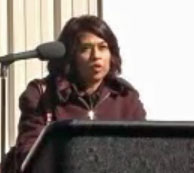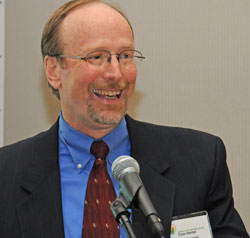 A very interesting presentation at our Farm Foundation Global Trade and Policy Issues conference had to do with the impact on poverty. Tom Hertel, Purdue University, was our presenter.
A very interesting presentation at our Farm Foundation Global Trade and Policy Issues conference had to do with the impact on poverty. Tom Hertel, Purdue University, was our presenter.
He says they conducted an international study of 16 developing countries and the impact of biofuels production on the poverty level. As he puts it, it’s a very complex issue. Most people he says think that just because food is scarce in low income countries that biofuels production from feedstocks would contribute to poverty but in fact, the opposite is true in some parts of the world like southeast Asia. However, in other parts of the world where the low income population is mostly urban, like South America, the opposite is true.
You can listen to my interview with Tom here: [audio:http://www.zimmcomm.biz/farm-foundation/ff-global-09-hertel.mp3]
You can download the interview with this link (mp3).
You can find photos from the conference here:
Transition To A Bio Economy Conference: Global & Trade Issues Photo Album


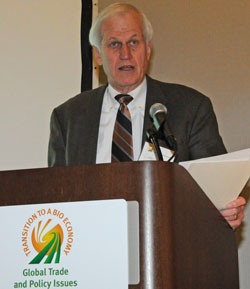 Former Texas Congressman Charles Stenholm was the moderator for our second session here at the Farm Foundation Global Trade & Policy Issues conference. I don’t think you’ll find anyone more knowledgeable about the policy side of this discussion.
Former Texas Congressman Charles Stenholm was the moderator for our second session here at the Farm Foundation Global Trade & Policy Issues conference. I don’t think you’ll find anyone more knowledgeable about the policy side of this discussion.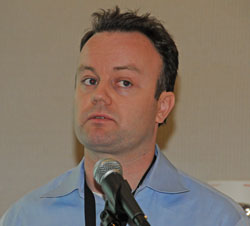 Providing us with a “Technical Global Biofuels Analysis” here at the Farm Foundation Global Trade & Policy Issues conference was Thomas Alfstad, Brookhaven National Laboratory.
Providing us with a “Technical Global Biofuels Analysis” here at the Farm Foundation Global Trade & Policy Issues conference was Thomas Alfstad, Brookhaven National Laboratory. 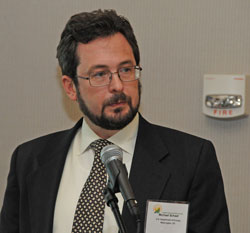 Michael Schaal is with the Energy Information Administration which is part of the U. S. Dept. of Energy. He spoke early on the program at the Farm Foundation conference about the global outlook for energy.
Michael Schaal is with the Energy Information Administration which is part of the U. S. Dept. of Energy. He spoke early on the program at the Farm Foundation conference about the global outlook for energy.  Both Chrysler and General Motors (GM) reportedly did not meet the terms of their Federal loans but they will be given a second chance to restructure and survive. This news is admist General Motors Chief Executive Rick Wagoner, who led the company for nine years, stepping down at the request of the Obama administration and Chief Operating Officer Fritz Henderson taking over.
Both Chrysler and General Motors (GM) reportedly did not meet the terms of their Federal loans but they will be given a second chance to restructure and survive. This news is admist General Motors Chief Executive Rick Wagoner, who led the company for nine years, stepping down at the request of the Obama administration and Chief Operating Officer Fritz Henderson taking over. “Let me say this as plainly as I can. If you buy a car from Chrysler or General Motors, you will be able to get your car serviced and repaired just like always,” Obama said in a speech today. “Your warranty will be safe. In fact, it will be safer than it has ever been. Because starting today, the United States will stand behind your warranty.”
“Let me say this as plainly as I can. If you buy a car from Chrysler or General Motors, you will be able to get your car serviced and repaired just like always,” Obama said in a speech today. “Your warranty will be safe. In fact, it will be safer than it has ever been. Because starting today, the United States will stand behind your warranty.”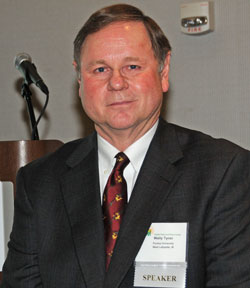 Today and tomorrow I’ll be covering the Farm Foundation,
Today and tomorrow I’ll be covering the Farm Foundation,  A proposed federally-owned “green bank” could finance many renewable energy projects, getting the credit markets for alternative energy moving again and spurring the burgeoning green economy.
A proposed federally-owned “green bank” could finance many renewable energy projects, getting the credit markets for alternative energy moving again and spurring the burgeoning green economy. Keep our friends at
Keep our friends at  The Sioux Falls Landfill is now providing methane gas to help power the daily operations of POET’s 105 million gallon per year ethanol
The Sioux Falls Landfill is now providing methane gas to help power the daily operations of POET’s 105 million gallon per year ethanol 